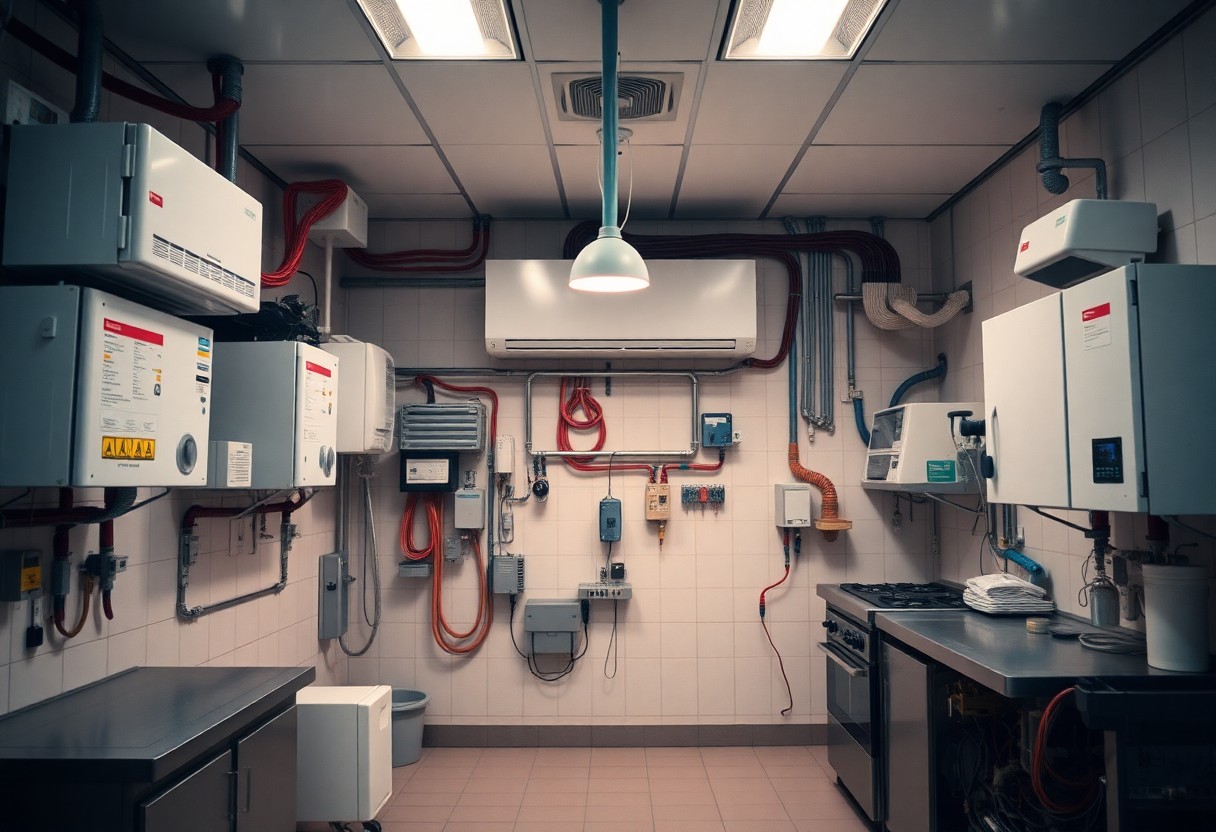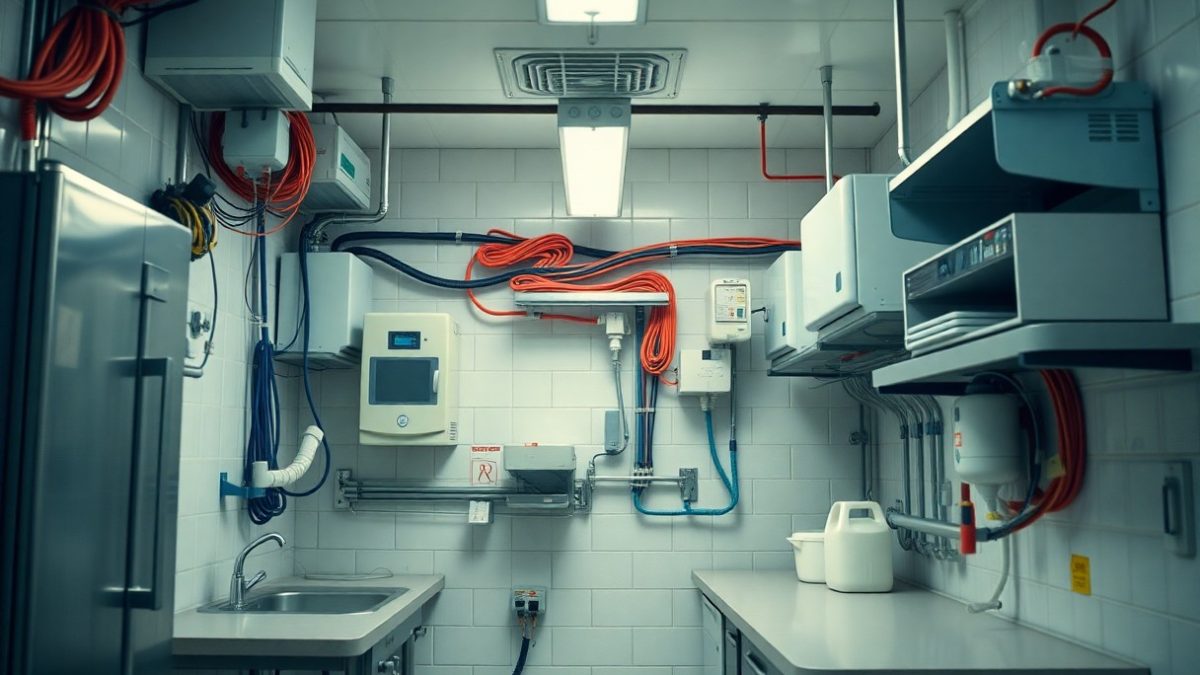
Appliance installation – Servisure
September 26, 2024
How Can A Zealous Approach To Grounding Elevate Your Appliance Installation Safety?
October 31, 2024Just when you think you understand the rules for commercial electrical appliance installations, you might discover a series of unconventional regulations that can catch you off guard. These regulations, often overlooked, vary by location and can significantly impact your business operations. In this blog post, you will learn about the specific requirements you need to consider to ensure compliance, as well as the potential consequences of neglecting these guidelines. Understanding these nuances can save you time, money, and frustration in the long run.
Understanding Commercial Electrical Appliance Installations
To navigate the complexities of commercial electrical appliance installations, you need to understand the unique challenges and demands placed on these systems. Unlike residential settings, commercial installations require adherence to stricter codes, safety standards, and are usually more extensive in scope. This knowledge will equip you to implement effective and safe electrical solutions tailored for your commercial needs.
Standard Regulations and Guidelines
Installations of commercial electrical appliances are governed by various regulations and guidelines established by organizations such as the National Electrical Code (NEC). These standards address everything from wiring and grounding to load calculations and circuit sizing, ensuring your setup meets safety and performance criteria.
Key Differences in Commercial Settings
Appliance installations in commercial settings differ significantly from residential ones, primarily due to the scale and intended use of the equipment. You may encounter unique demands such as higher power loads, specialized equipment, and differing regulatory requirements. This often necessitates customized solutions, professional oversight, and a comprehensive understanding of local codes.
Indeed, these differences manifest in various ways, such as the necessity for three-phase power systems in larger appliances, which can efficiently handle greater loads. You may also find that commercial appliances often require more intricate wiring solutions and unique safety considerations, including fail-safes that aren’t typically needed in residential environments. Additionally, installation times and procedures vary, demanding more robust project management and skilled labor to ensure compliance and operational efficiency.
Unconventional Regulations in Various Regions
While many industries adhere to standard electrical codes, some regions impose unconventional regulations for commercial electrical appliance installations. These regulations often stem from local environmental concerns, cultural practices, or economic circumstances. Understanding these unique requirements can help you navigate compliance effectively and avoid potential penalties while establishing your business in different areas.
Regional Variations and Compliance
Variations in compliance often reflect the diverse needs of communities. You may find strict energy efficiency standards in California, while some rural areas in Texas might prioritize simplicity and speed of installation over meticulous regulation. Being aware of these regional differences is necessary for ensuring your installations meet local mandates.
Case Studies of Unique Regulatory Practices
Across the globe, different regions have adopted innovative regulatory approaches tailored to their specific needs. These case studies illustrate how local governments and organizations have adjusted electrical appliance installation regulations to accommodate unique circumstances:
- Germany: Implemented a 2022 policy that requires all commercial buildings to use smart meters, resulting in a 20% reduction in energy waste.
- Japan: Mandates earthquake-resistant electrical installations, leading to a 30% decrease in electrical failures during seismic events.
- Canada: Introduced a regulation in 2020 that demands solar integration in new commercial buildings, boosting renewable energy usage by 15%.
- Australia: Launched a program in 2019 that offers incentives for businesses using energy-efficient appliances, resulting in a 25% increase in compliance.
Another impactful approach can be seen in these additional case studies that highlight unique regulatory practices, helping you grasp the importance of adapting to local requirements:
- United Kingdom: Enforced regulations in 2021 requiring commercial kitchens to install grease traps, which has reduced pollution discharge into the sewage system by 40%.
- Brazil: Passed a law in 2023 mandating electrical safety inspections for all commercial properties, reducing electrical hazards and incidents by 50% in urban areas.
- South Korea: Instituted a 2018 regulation requiring regular audits of energy consumption, leading to an overall reduction of 12% in commercial energy usage.
- Singapore: Adopted an innovative approach in 2022 aimed at integrating IoT-based monitoring for electrical appliances, enhancing maintenance efficiency by 35%.
Environmental Considerations
You need to be aware of the various environmental regulations that impact commercial electrical appliance installations. These regulations are designed to minimize the ecological footprint of your operations and ensure compliance with local, state, and federal laws. For a deeper understanding of the standards that apply to you, check out The Ultimate Guide To Appliance Installer Certification.
Sustainability and Energy Efficiency Mandates
Environmental regulations frequently include mandates focused on sustainability and energy efficiency for commercial appliances. These requirements ensure that your installations use less energy, reduce waste, and promote sustainability practices. Compliance with these mandates not only benefits the environment but can also lead to cost savings over time.
Green Technologies and Their Regulatory Implications
Regulatory frameworks increasingly favor green technologies in appliance installations. This shift often comes with specific guidelines on the types of materials and systems you can use, ensuring they meet environmental standards.
This focus on green technologies is transforming the landscape of commercial electrical appliance installations. State and federal regulations may impose certifications for energy efficiency and restrict harmful substances in manufacturing. By staying informed on these evolving standards, you can make informed choices that align with compliance and sustainability goals, ultimately enhancing your business’s market appeal while minimizing ecological impact.
Safety Protocols and Risk Management
Keep your work environment as safe as possible by understanding and implementing appropriate safety protocols. Ensure that all employees are adequately trained on emergency procedures and that the workplace adheres to both local and federal regulations regarding electrical appliance installations. Regular maintenance and inspections can significantly reduce risks, while employing risk management strategies will prepare you for unforeseen incidents.
Common Hazards in Commercial Settings
Above all, electrical hazards can pose serious threats in commercial environments. These may include faulty wiring, overloaded circuits, and inadequate grounding. Familiarizing yourself with common risks associated with your specific appliances will help you adopt preventive measures and promote a safer workspace.
Unconventional Safety Standards
Hazards in commercial electrical installations may sometimes involve unconventional safety standards that aren’t widely recognized. These standards could stem from unique operational requirements or the specific needs of your business industry.
It is crucial to stay informed about these unconventional safety standards, as they often address niche risks that can significantly impact your operations. Recognizing these specialized guidelines will allow you to tailor your safety protocols accordingly and mitigate potential hazards unique to your setting. This proactive approach not only protects personnel but also enhances the longevity of your appliances and strengthens overall operational resilience.
Impact of Technology on Regulations
Once again, advancements in technology are reshaping the landscape of commercial electrical appliance installations. As you adopt innovative appliances, regulatory bodies must adapt their guidelines to ensure safety, efficiency, and compliance with modern standards. The integration of smart technology introduces new considerations, compelling regulators to establish frameworks that accommodate both traditional and smart devices while maintaining rigorous safety measures.
Smart Appliances and Regulatory Challenges
Before you consider installing smart appliances, be aware of the regulatory challenges they present. These devices often operate within the Internet of Things (IoT), generating complex scenarios where traditional regulations may not apply. This mismatch can create uncertainties in compliance, urging you to research local regulations before adopting such technologies.
Future Trends in Regulation Adaptation
Adaptation is vital as technology continues to evolve rapidly. As more businesses implement smart appliances, regulators will likely develop new guidelines to address these innovations while ensuring safety and efficiency. This evolution will require you to stay informed about changes to maintain compliance with updated regulations.
Plus, emerging trends indicate that regulatory agencies will increasingly incorporate flexible standards to accommodate technological advancements. You can expect a push towards collaborative efforts between manufacturers and regulators to define best practices, ensuring that new innovations enhance safety rather than compromise it. Keeping abreast of these developments will be key to your compliance and operational success in a tech-driven environment.

Best Practices for Compliance
For successful compliance with unconventional regulations surrounding commercial electrical appliance installations, it’s imperative to conduct thorough research and stay updated on local codes. Regular training for your team on best practices and incorporating checklists can streamline the process. Additionally, fostering relationships with local authorities and proactively seeking their guidance can help you understand the specific requirements that may apply to your installations.
Navigating the Regulatory Landscape
Any professional in the electrical appliance industry must be adept at navigating a complex array of regulations. Staying informed about updates to local, state, and federal guidelines is vital. Consider leveraging specialized software or consulting with compliance experts to help you manage these evolving regulations effectively.
Resources for Professional Guidance
Against the backdrop of evolving regulations, access to reliable resources for professional guidance is imperative. Laws and standards can vary widely by location and industry, making it imperative for you to seek expert advice tailored to your specific needs.
To enhance your understanding and compliance with regulations, consider consulting legal professionals or compliance consultants who specialize in commercial electrical installations. Professional organizations often provide resources, workshops, and seminars that can help you stay informed about current trends and regulatory changes. Additionally, online forums and communities can offer peer support and knowledge-sharing opportunities. Utilizing these resources can significantly empower you to navigate the regulatory landscape more effectively.
Summing up
Ultimately, understanding the unconventional regulations surrounding commercial electrical appliance installations can significantly impact your business operations. You must navigate a complex landscape of local codes, safety standards, and energy efficiency mandates that often vary by jurisdiction. By staying informed about these unique requirements, you can ensure compliance, enhance safety, and optimize performance in your commercial space. Knowledge of these regulations not only protects your investment but also positions your business for success in an increasingly regulated environment.

